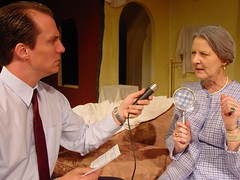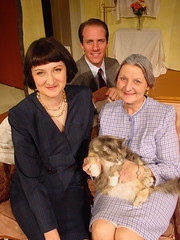The museum's burning, and you're alone in a room with a Van Gogh and a baby. Which do you save?
A.R. Gurney’s The Golden Age, however, makes the old chestnut harder to crack: What if the choice was between a precious artifact and, not an innocent child, but a damaged adult, one who’d had her chances and wasted them? Wouldn’t you be a bit more tempted then to save the masterwork from destruction?
In Gurney’s play, an ambitious young academic has located a reclusive grande dame who claims to have known just about everybody who was famous back in the Roaring ‘20s. She may or may not have a few lower-grade historical keepsakes along with one spectacular literary gem; but what she definitely does have is a granddaughter -- needy, aimless, escaping into alcohol. Can “Gram” string the young man along, using the granddaughter as bait and the specter of a long-lost manuscript as the ultimate prize? Is the young man so intent on that prize that he would stifle his own feelings and toy with others’?
As Tom, the ambitious scholar of American lit, Mathew Ahrens looks the part but overacts. He’s eager to make a major find, write a major book, get a major advance. But Ahrens’ eagerness strikes a high note early in the evening and never wavers from it. He’s so excited by every postcard or letter from the next famous author that Mrs. Hoyt claims to have known that he “has nowhere to go,” as actors say -- there’s no way to elevate the energy any higher, so everything’s delivered at the same pitch and intensity.
In fairness, Ahrens needs to deliver high-voltage performance -- to move along a talky play, and to demonstrate the passion that at least some folks have for artifacts from a bygone era. The women want love and affection (which is more understandable and accessible); the scholar is after the fame that comes from achieving historic preservation.
While there’s too much of skidding past the furniture and open-mouthed anguish in Ahrens’ interpretation every time names like Hemingway and Trotsky are broached, there’s also hope that over the course of the run, he’ll tone down the eagerness in places. Ahrens depicts an intelligent enough chap, but there’s too much of the puppy dog in his performance.
That creates an imbalance in the play’s predominant conflict: Since the grand old lady has all the life experience (and a more common desire -- to leave a legacy, to provide for a loved one) on her side, too much puppy-dog eagerness by the young man tilts the field too much to Isabel’s side.
Ann Whiteman, however, knows how to take command whenever the spotlight tilts in her direction. As Isabel Hastings Hoyt -- one of those three-name women whose moniker bespeaks past romances and present wealth -- Whiteman’s eyes narrow in command and glint whenever she feels the flirtatious mood descending upon her.
As with Daisy Buchanan in the Fitzgerald novel that Ahrens’ character salivates over, there needs to be money in Isabel’s voice -- and Whiteman pays off. She’s accustomed to being obeyed; she shifts into coquette mode automatically, even a half-century past her time; she knows how to tempt and seduce with an actress’ touch. For Gurney has plugged the plot hole about why a reclusive, elderly woman who (we find out) has reasons to dread memories of her past and anticipations of her future suddenly starts showing off for an uninvited guest. Why does the Miss Havisham of 1980 start elaborating so many name-dropping stories? Because she once was on the stage herself.
Whiteman plays the self-conscious artifice of the moment to the hilt: “I was on the stage, yes,” she murmurs to the young man who’s agape with admiration, “and I still am.” She exults and raises her arms, well, theatrically.
There’s a moment when the academic asks her why she doesn’t consider the ‘20s a golden age, and when director Michael Weaver (wisely) lets Whiteman hold sway at downstage front. Mrs. Hoyt proceeds to deliver a hymn of praise to all the people who make any glorious era possible -- the workers and laborers in all those unglamorous jobs that make glamor possible. Whiteman projects the passion of a woman who’s convinced that living, breathing people - their emotions and worries and aspirations -- are of far more worth than any promise of a letter that Sigmund Freud may or may not have penned. Late in the play, when her character is swooning over a Verdi aria, Whiteman’s performance hints at some of the wounded, commanding bravura that graced her portrayal of Maria Callas in Master Class at the Met some years ago. She’s just as dominating and impressive in this show.
As the granddaughter, Tessa Gregory is helped in her characterization by Lisa Caryl’s costumes -- a baggy beige sweater for her dowdy first appearance, a little black dress for when the ugly duckling goes out on a date, transforming into the swan in a ballet orchestrated by her grandmother to snare the handsome young prince. Gregory’s deep voice serves her well in different way -- awkward in the initial scenes, more self-assured once it’s clear that Gram’s plan is working.
John Hofland’s set, with its autumnal leaves and plain brownstone exterior, gives way to a living room n which everything (literally) is shrouded in mystery. Somehow the quirkiness of Isabel Hastings Hoyt is lost -- more gewgaws in the parlor, perhaps, or more glimpses of eccentricity in Kimberly Crawley’s furnishings -- might have conveyed more of Mrs. Hoyt’s alluring past.
Weaver keeps the blocking varied in this three-hander, though he hasn’t done enough to tone down the melodramatics of the second half of Gurney’s script or Ahrens’ sometimes frenzied manner. But then Whiteman’s performance makes up for such deficiencies.
In other words, come see ARt’s The Golden Age for Whiteman’s haughty, flirty performance, then stay for the mind-bending dilemma Gurney presents between a glorious but dead past and a mundane but very much alive present -- or, more precisely, between the desires of ambition (fame during this life) and the desire to leave a legacy (fame after one’s dead).
Actor’s Rep has kicked off its second season with a solid and thought-provoking production that lingers a little too long (2:10 after a late start and one intermission) to make its philosophical points. At least there’s a chance to take one of the cast members home with you after the show (wink, wink): Gus the cat, who makes a couple of cameo appearances, is being raffled off (tickets only $2!) for a couple of equally important causes: animal protection and theatrical protection.



